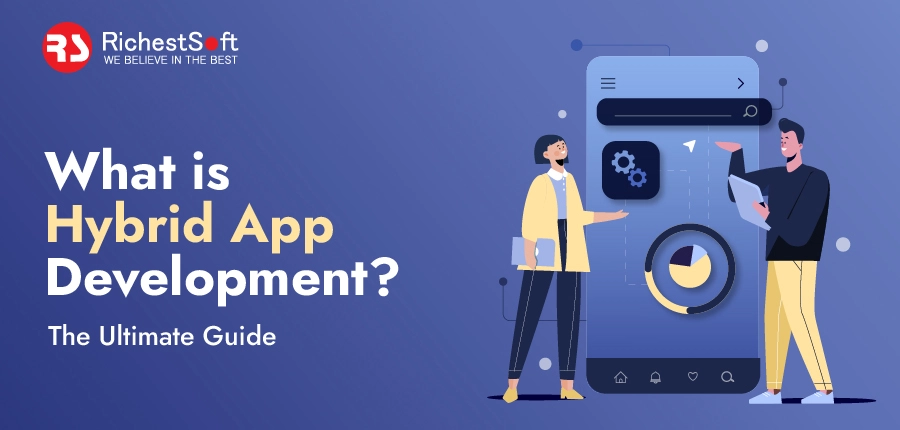Imagine an app that built once and can be utilized across all platforms like android ,iOS, different phones and tablets ? isn’t it amazing and cost effective ? well that’s what hybrid apps will do and we will learn more about it in this blog.
Although hybrid applications are not as popular as native apps, they do have several excellent benefits that are worth your attention.
To gain knowledge on hybrid app development? We will go through hybrid application development in this post and why it can be the best option for you. Additionally, we’ll go through the many phases of creating a hybrid project and the ideal frameworks to employ.
What is Hybrid App Development?
The fundamental principle of the hybrid app development approach is to create an app with a single project utilizing a framework that can target all the necessary platforms (Android, iOS, Windows, etc.).
Hybrid apps have a lot of appeals since they can be built from a single set of code that can serve several platforms. The code just needs to be written once, and then it can be reused when building for any other target platform, with certain exceptions (the main one being the UI, which customers want to be personalized to their platform of choice).
Two evident factors are increasing the need for hybrid apps:
1. The development process is simpler than that of native apps, and the code can be utilized to increase a company’s presence on many platforms, including the web.
2. Business owners are drawn to hybrid app development because it allows them to enter the mobile market on all major platforms simultaneously.
Benefits of Choosing Hybrid App Development over Native App Development
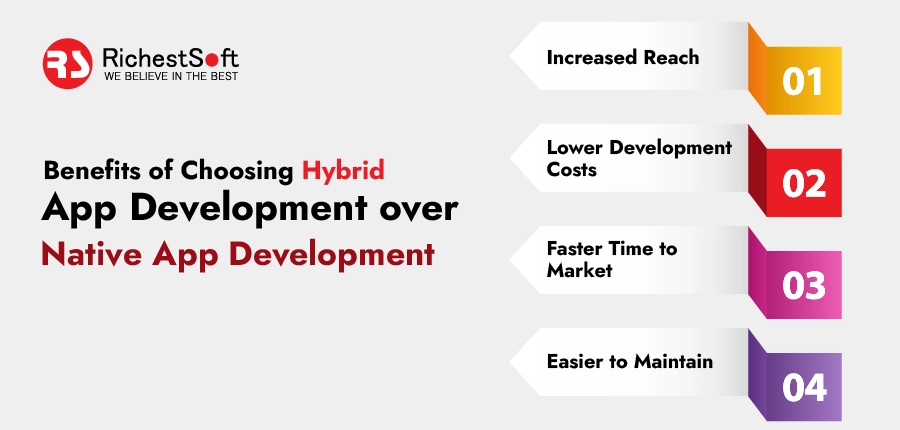
In the fast-paced world of app development, there are always new trends and technologies emerging. It can be hard to keep up with everything and make decisions about which route to take for your next project. If you’re considering hybrid app development, you may be wondering what benefits it offers over native app development. In this blog post, we’ll break down some of the key advantages of hybrid app development so you can make an informed decision for your business.
1. Increased Reach
With hybrid app development, you can build an app that can be deployed on multiple platforms with a single codebase. This means you can reach a wider audience with your app without having to invest in separate native apps for each platform.
2. Lower Development Costs
Developing a single hybrid app is typically cheaper than developing two separate native apps (one for each platform). This is because you only need to develop and maintain one codebase instead of two.
3. Faster Time to Market
Since you’re only developing one codebase for multiple platforms, you can get your hybrid app to market faster than if you were developing separate native apps. This is especially beneficial if you’re working with a limited budget and need to get your app out as quickly as possible.
4. Easier to Maintain
If there are any changes or updates that need to be made to your app, you only need to update one codebase instead of multiple native codebases
Best Hybrid App Frameworks
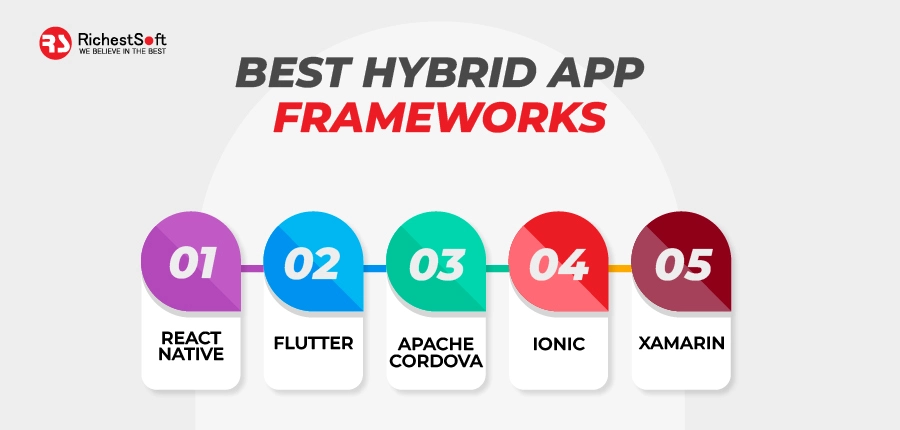
Now more than ever, you may choose from a wide variety of hybrid app frameworks. Each framework has advantages and disadvantages; pick the one that works best for your needs.
1. React native
React Native is another popular hybrid app framework. It uses the same programming language as React, which is JavaScript. This makes it very easy for developers who are already familiar with React to get started with React Native. The biggest advantage of React Native is that it provides great performance since it uses the same native components as regular native apps. The biggest disadvantage of React Native is that some features are still missing and there are not as many libraries available yet.
Launch date:- 26 March 2015
Official link:-https://reactnative.dev/
Youtube video:- https://www.youtube.com/watch?v=0-S5a0eXPoc
Example of apps built with the react native
2. Flutter
Flutter is a newer hybrid app framework that has been gaining a lot of popularity lately. It uses Dart as its programming language which gives it some unique advantages over other frameworks. One advantage is that Dart compiles directly to native code so you don’t need a JavaScript bridge as you do with other frameworks such as React Native. This means that Flutter apps can run on both iOS and Android without any performance issues.
Launch date:- May 2017
Official link:- https://flutter.dev/
Youtube video:- https://www.youtube.com/watch?v=VPvVD8t02U8
Example of apps built with the flutter
- Hamilton app
- hookle app
- Google Ads app
3. Apache Cordova
One of the most popular hybrid app frameworks is Apache Cordova. Cordova allows developers to use HTML, CSS, and JavaScript to create native mobile apps. One of the biggest advantages of using Cordova is that it supports a wide range of platforms, including iOS, Android, Windows Phone, and BlackBerry. Another advantage is that it’s open source and free to use. However, one downside of Cordova is that it doesn’t have a lot of built-in features, so developers often have to create their own plugins to add functionality.
Launch date:- 2009
Official link:-https://cordova.apache.org/
Youtube video:- https://www.youtube.com/watch?v=CDY1fRZycGk
Example of Apps Built with the Apache Cordova
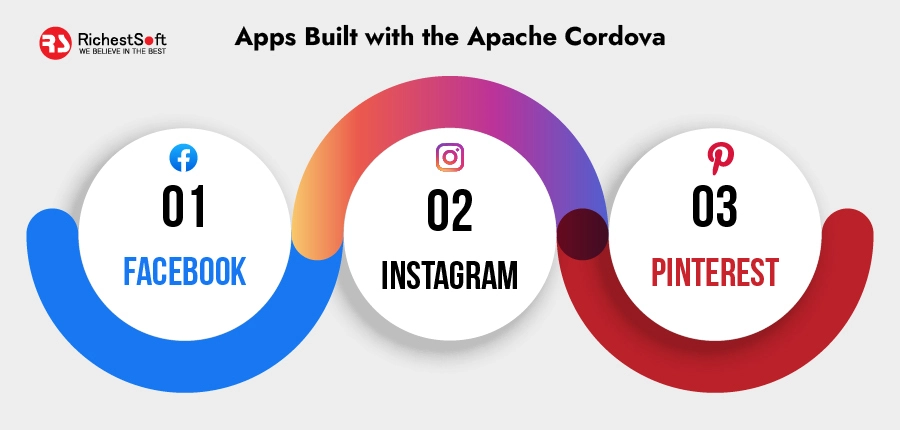
4. Ionic
Ionic is one of the most popular hybrid app frameworks out there. It allows developers to create cross-platform apps using web technologies like HTML, CSS, and JavaScript. The biggest advantage of Ionic is that it makes it very easy to create beautiful and user-friendly interfaces. The biggest disadvantage of Ionic is that it can be a bit slow compared to native apps.
Launch date:- 2013
Official link:-https://ionicframework.com/
Youtube video:- https://www.youtube.com/watch?v=0jamhGf-8ww
Example of apps built with the Ionic
- Uber
- Sworkit
- MyFitnessPal
5. Xamarin
Xamarin provides several benefits for developers, including the ability to share code across multiple platforms, access to native APIs and UI controls, and performance that is on par with native apps. Additionally, Xamarin makes it easy to integrate with existing .NET libraries and frameworks.
Launch date:- 2021
Official link:-https://visualstudio.microsoft.com/xamarin/
Youtube video:- https://www.youtube.com/watch?v=zvp7wvbyceo
Example of apps built with the Xamarin
- Pinterest and
- Snapchat
Advantages of Hybrid Application Development

Hybrid app development is very common because it has several advantages for organizations. It is a very practical choice for creating mobile apps and strikes the ideal combination between affordability and functionality. Let’s examine the nine advantages it offers:
Multi-Platform Assistance
Apps that are hybrids support many platforms. It is simple to scale for other platforms and only utilizes one code base. An app can easily be released on other platforms like iOS and Windows once it has been developed for one platform, let’s say Android.
Easily Maintained
The ease of maintenance is tremendous because there is only one codebase. No matter how many platforms the program runs on, there is only one database that needs to be managed. Additionally, HTML scripts require little upkeep.
Greater Developmental Speed
Due to the benefit of having a single codebase, hybrid application development is quicker than native app development. In actuality, hybrid apps would only take half as long to design as native apps. Businesses may quickly deploy an MVP as a result, which is a huge value. They can enter the market quickly and get a competitive edge because of this.
Lower Development Costs
There is no need to spend money on creating distinct apps for various platforms when hybrid app development is used. This substantially lowers the cost of development. Additionally, fewer developers are needed and less time is spent on development, which further reduces costs.
Utilization of Device Features
The inability of online apps to access a device’s functionality, such as the contact book, camera, etc., was a big drawback. Hybrid apps get around this drawback. Hybrid apps can access device functionalities just like native apps. The app development frameworks and associated plugins make this feasible.
Offline Assistance
The offline functionality of hybrid apps is one of its many advantages. In circumstances like continuous travel or erratic network connectivity, it is quite helpful. Data can be locally stored by hybrid apps. They can use it to load previously loaded data into the app. Therefore, users can still use hybrid apps in an offline mode even though they might not have access to real-time data.
Native knowledge
Users of hybrid apps get a close-to-native experience. It consistently performs well and has outstanding smoothness on a variety of devices. It is successful in giving users a smooth user experience.
Wonderful Performance
Performance-wise, hybrid apps outperform both responsive and progressive web apps. Since they are small and light, apps load very quickly. Additionally, the performance is further enhanced by their loading independence from the network.
Simple to Update
A native app update is essential for both developers and users to get the maximum performance out of the program. Updates take time and may cause problems. Hybrid apps provide simple updates, improving user happiness.
Top Hybrid Apps Examples
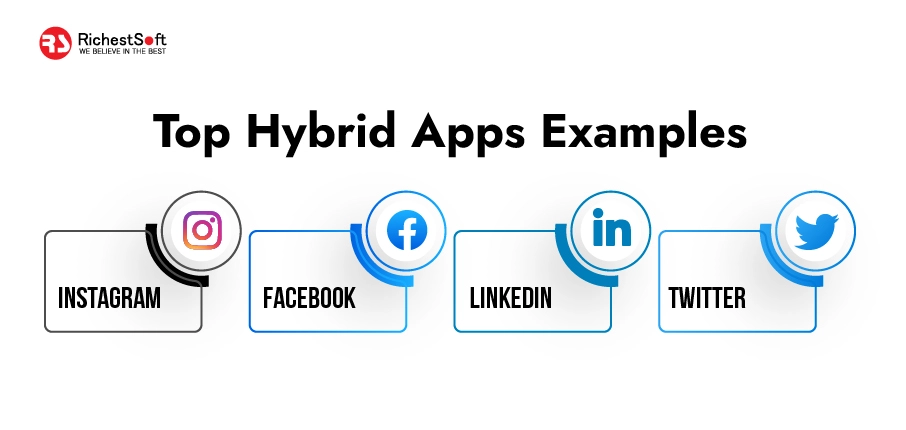
There are a lot of hybrid apps on the market, but only a few stand out. Let’s look at some of the best examples:
Instagram: This popular photo-sharing app was developed using the hybrid app framework, PhoneGap.-
Facebook: The world’s largest social network also uses the PhoneGap framework for its mobile app.-
LinkedIn: The business-focused social networking site also uses PhoneGap for its mobile app.-
Twitter: Another popular social media platform that uses the PhoneGap framework for its mobile app.
Tips for Building a Feature-Rich and Cost-Effective Hybrid App
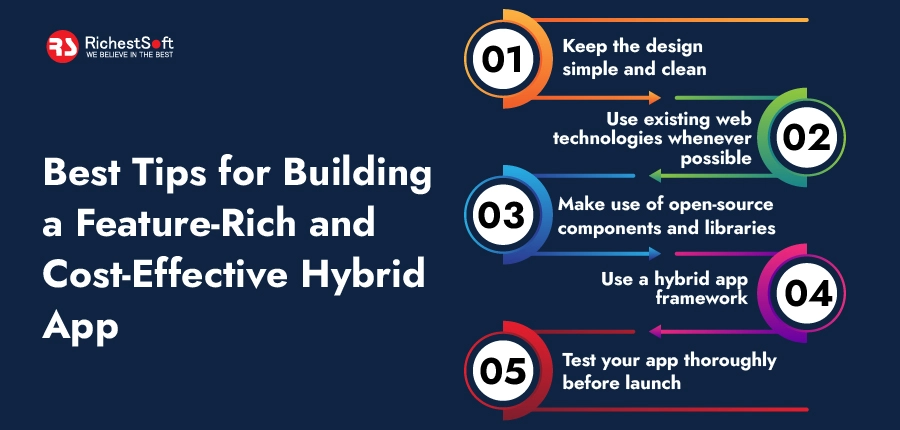
When it comes to hybrid app development, there are a few key things to keep in mind in order to build a feature-rich and cost-effective app. Here are some tips to get an idea.
1. Keep the design simple and clean. This will minimize development expenses and time.
2. Use existing web technologies whenever possible. This will again help reduce development time and costs.
3. Make use of open-source components and libraries. This can save you a lot of money on development costs.
4. Use a hybrid app framework such as Cordova or Ionic Framework. These frameworks can help simplify the development process and make your app more robust.
5. Test your app thoroughly before launch. This will ensure that there are no bugs or issues with your app when it goes live.
Best Practices for Developing a Secure and Scalable Hybrid app
When it comes to developing hybrid apps, there are a few best practices that should be followed in order to create a secure and scalable product.
1. Use a reputable framework: Selecting a reputable framework is key to ensuring the security and scalability of your app. Some popular options include Ionic, Cordova, and React Native.
2. Follow security best practices: Be sure to follow security best practices when developing your app, such as encrypting data and using secure authentication methods.
3. Optimize for performance: Performance is crucial for hybrid apps, so be sure to optimize your code for speed and efficiency.
4. Test thoroughly: Thoroughly test your app before launch to ensure that it is stable and free of any bugs or errors.
Bonus Material: How Hybrid App Development is Beneficial for both Developers & Clients?
Cost Estimation for Hybrid app Development
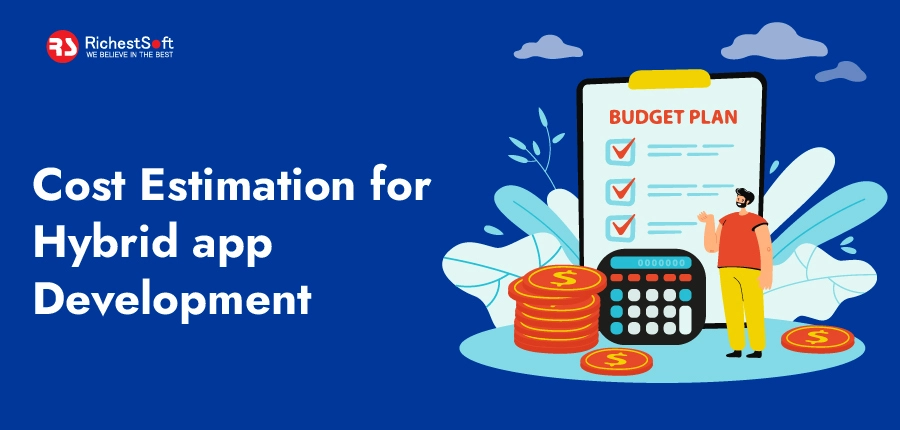
The cost of hybrid programs is difficult to estimate. In contrast, the cost to implement this is much lower than that of developing a native mobile app. What you want the app to look like and how long it takes to make both might affect the final price.
Price ranges for moderately complex, highly complex, and extremely complex hybrid mobile apps are as follows:
Basic hybrid mobile apps: These apps aren’t as hard to make, so it takes less time for developers to make them. The approximate price is $10,000.
Mid-complex hybrid mobile apps: Costs for more advanced apps can range from $10,000 to $50,000. It would take two to three months to build them.
Enterprise hybrid mobile apps are time-consuming to develop because of their numerous features and overall complexity. They have a launch time of 3-6 months and an associated cost of $50,000-$150,000.
Games: Game development takes the most time and can cost as much as $250,000 with hybrid app development services. Firms that bill by the hour often start at $50 an hour.
Also Read: How Much Does it Cost to Build a Mobile App?
FAQs
Q.What is Hybrid App Development?
Hybrid app development is the process of creating a mobile application that combines web technologies with native elements. This allows businesses to create applications that are faster, more reliable and consistent across different platforms, while still providing the unique benefits and features of the different operating systems. Hybrid apps provide a user experience that is both intuitive and engaging, making them ideal for businesses looking to expand their reach.
Q.Which is the best hybrid app framework?
With hybrid app development, there is no one-size-fits-all answer – the best framework depends on the needs of your project. However, some common frameworks used in hybrid app development are Ionic, React Native, and Xamarin. Each offers different capabilities and features which make them better suited for certain types of projects. Do your research and decide which platform is right for you!
Q.What are the benefits of hybrid app development?
Hybrid app development offers several benefits to businesses, including cost-effectiveness, faster development times, and increased performance. Compared to native apps, hybrid apps are quicker and easier to develop and maintain, resulting in initiatives that can be completed more quickly and at a lower cost. Additionally, hybrid apps provide a seamless user experience across different devices and platforms without sacrificing performance.
Q.What is the Cost estimation for Hybrid app development?
The cost of Hybrid App Development depends on the complexity and functionality of the app. Our team can provide you with a detailed estimation including development hours, hardware and software requirements, design costs, maintenance costs etc. The cost may vary depending on the features that you require in your app such as third-party integrations, server setup, data storage and security. We understand that pricing is very important for you and we always strive to provide the best value for your money.
Q.What are the stages involved in Hybrid app development?
The first stage is to define the business goals and objectives of the project. After this, we will work on the user experience design and create the structure of your app. We then move on to developing the features and functionality of your app using programming languages like HTML, CSS, and JavaScript. Finally, we thoroughly test your app before releasing it into the market. In each stage, our experts are dedicated to helping you build an innovative and successful hybrid app.
Conclusion
Hybrid app development is a revolutionary way of developing mobile apps that combines the best of web and native technologies. With hybrid app development, you can create an application that looks and feels like a native app but runs on any device or platform. We hope this guide has provided you with the information needed to get started with creating your own hybrid app, from selecting the right framework to launching it successfully on multiple platforms.
 +1 315 210 4488
+1 315 210 4488 +91 798 618 8377
+91 798 618 8377